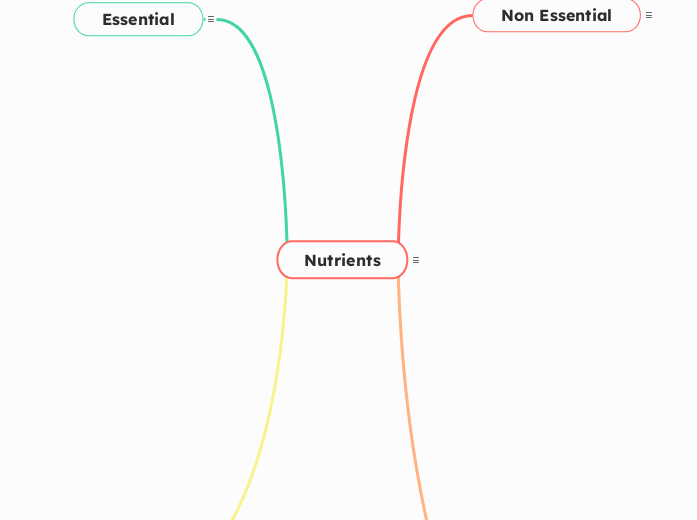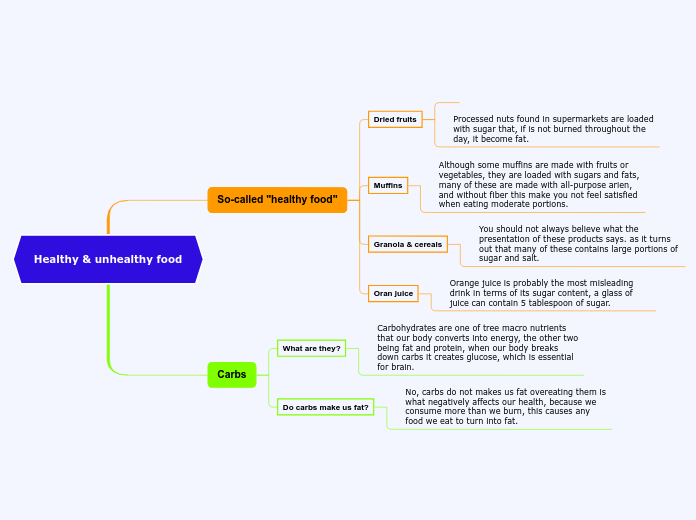Nutrients
Substances found in food that provide energy, support growth, and maintain body functions.
Micronutrients
Water
Vital for hydration, temperature regulation, and nutrient transport.
Minerals
Inorganic compounds that support body structure and function.
Trace Minerals
Needed in small amounts.
Iodine
Needed for thyroid hormone production.
Zinc
Supports immunity and wound healing.
Iron
Key for oxygen transport in blood.
Electrolytes
Help maintain fluid balance and nerve signaling.
Potassium
Essential for muscle function and nerve signaling.
Sodium Chloride (NaCl)
Regulates blood pressure and fluid balance.
Major Minerals
Needed in larger amounts.
Magnesium
Supports nerve, muscle function, and bone health.
Sulfur
Essential for protein structure.
Calcium
Supports bones and teeth, muscle function.
Vitamins
Essential organic compounds that support body processes.
Water Soluble
Not stored in the body, must be consumed
Vitamin B Complex
Group of B vitamins important for energy and cell health.
Meat
Source of B12 and other B vitamins critical for metabolism.
Grains
Source of some B vitamins, particularly B1 (thiamine).
Vitamin C
Antioxidant; supports skin, immune system, and healing.
Antioxidants
Prevent cell damage by neutralizing free radicals.
Fat Soluble
Stored in body fat, used when needed.
Vitamin K
Vital for blood clotting and bone health.
Vitamin E
Antioxidant that protects cells.
Vitamin D
Essential for bone health and calcium absorption.
Vitamin A
Supports vision and immune health.
Essential
Nutrients that our body needs to take
Macronutrients
Fats
Provide energy, support cell structure, and help absorb fat-soluble vitamins.
Monosaturated
Beneficial, help reduce bad cholesterol.
Saturated Fats
Typically solid at room temperature, should be consumed in moderation.
Polysaturated
Include essential fats like Omega-3 and Omega-6.
Unsaturated Fats
Generally beneficial fats.
Trans Fats
Partially hydrogenated, unhealthy.
Fatty Acids
Key components of fats.
Linolenic Acid
Essential Omega-3 fatty acid.
Omega 3
Supports heart and brain health.
Linoleic Acid
Essential Omega-6 fatty acid.
Omega 6
Supports skin and hair growth, bone health.
Lipids
General term for fats and related substances.
Proteins
Build and repair tissues, support immune function.
Storage
Casein
Milk protein, provides amino acids.
Ferritin
Stores iron.
Amino Acids
Building blocks of proteins.
Non Synthesized
Must be obtained from diet.
Incomplete
Lack one or more essential amino acids.
Complete
Contain all essential amino acids.
Synthesized
Produced by the body.
Fibrous Proteins
Provide structure.
Elastin
Allows tissues to stretch.
Collagen
Provides skin elasticity.
Keratin
Makes up hair, skin, and nails.
Fluid Balance
Maintains body fluids.
Globulin
Immune proteins.
Immunoglobulins
Antibodies fighting infection.
Albumin
Maintains fluid balance in blood.
Lipoproteins
Transport fats in the bloodstream.
Carbohydrates
Main energy source for the body.
Complex Carbohydrates
Provide sustained energy.
Polysaccharides
Long chains of sugar molecules.
Fibers
Aids digestion.
Soluble
Lowers cholesterol and stabilizes blood sugar.
Insoluble
Promotes bowel health.
Starch
Main energy storage in plants.
Simple Carbohydrates
Quick energy sources.
Monosaccharides
Single-sugar molecules.
Glucose
Primary energy source.
Glycogen
Stored glucose in liver and muscles.
Triglycerides
Stored form of energy in fat cells.
Energy
Fuels body processes.
Disaccharides
Two-sugar molecules.
Lactose
Sugar found in milk.
Sucrose
Common table sugar.
Non Essential
Nutrients that our body can produce









